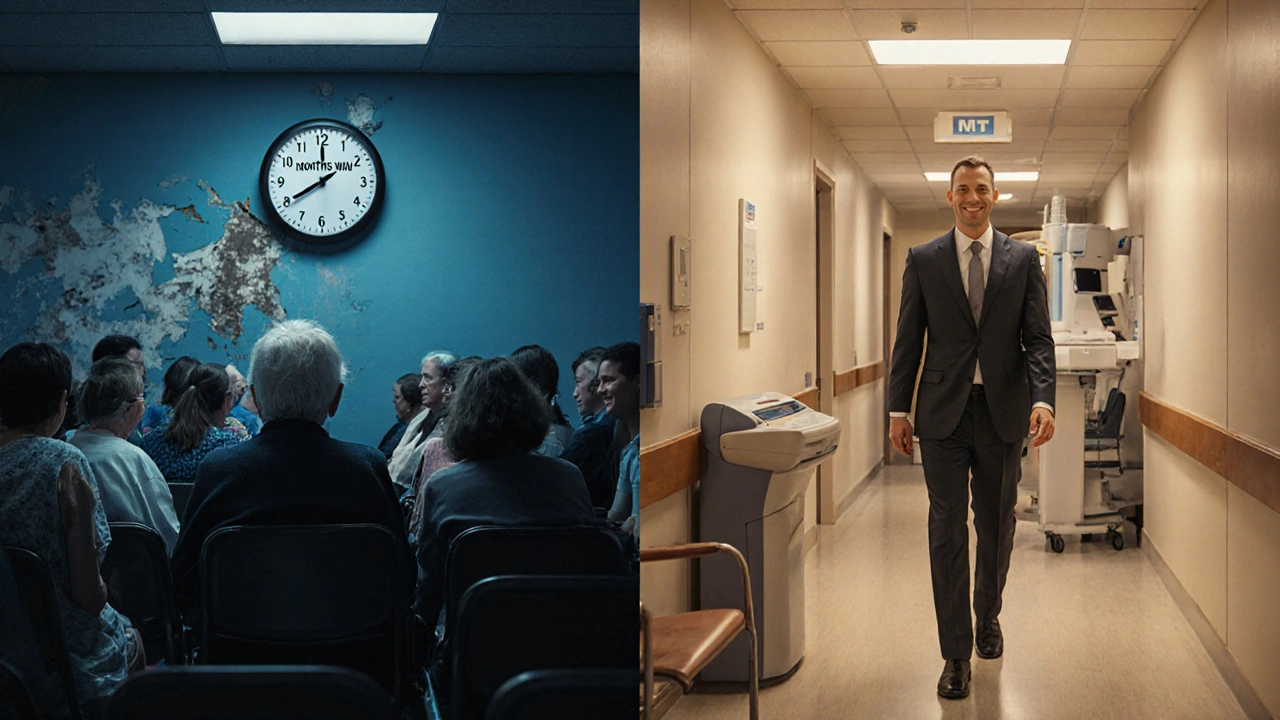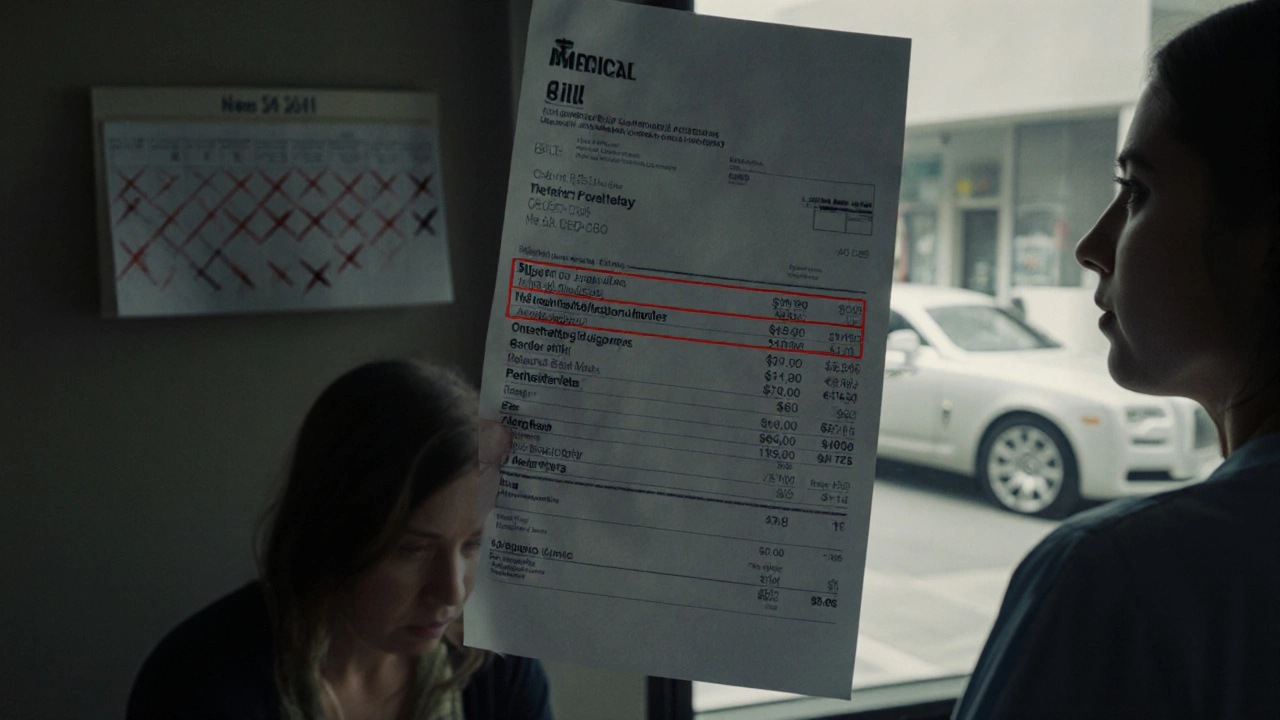 Oct, 29 2025
Oct, 29 2025
Healthcare Wait Time Calculator
See the Wait Time Difference
Private healthcare often provides faster access for those who can pay. Compare average wait times for common procedures to understand the access gap.
Results
Private healthcare isn’t just expensive-it’s rigged in ways most people never see until they’re the ones stuck paying the bill. You don’t need to be a doctor or a policy expert to understand this. All you need is to have watched someone you love wait months for a scan because the public system is overloaded, then watched a neighbor get the same scan the next week because they could afford to pay out of pocket. That’s not luck. That’s a system designed to reward money, not need.
It’s not about quality-it’s about access
People say private healthcare offers better care. Sometimes it does. But that’s not the point. The real problem is that private healthcare turns medical need into a privilege. If you have the cash, you jump the line. If you don’t, you wait. And waiting isn’t just inconvenient-it’s dangerous. A 2024 study from the University of Auckland tracked 12,000 patients with early-stage cancer. Those who accessed private care got treatment 47 days faster on average. Those relying on public care? 132 days. That’s four months. In cancer, those months can mean the difference between survival and death.
Private clinics don’t make you healthier. They just make you faster. And speed, in healthcare, is often life or death.
Insurance doesn’t fix it-it deepens the divide
Some argue that private health insurance levels the playing field. It doesn’t. Most insurance plans exclude pre-existing conditions. They cap annual payouts. They charge higher premiums for older people, people with chronic illnesses, or even people who live in certain neighborhoods. In New Zealand, a 58-year-old with type 2 diabetes might pay $1,800 a year for private insurance-and still get denied coverage for insulin pumps or nerve pain treatments. Meanwhile, a 30-year-old with no health issues pays $450 and gets full coverage for everything from physio to cosmetic procedures.
Insurance companies aren’t charities. They’re businesses. And they profit by avoiding the people who need care the most. That’s not healthcare. That’s risk selection disguised as choice.
Private hospitals cherry-pick patients
Private hospitals don’t treat everyone. They pick the easiest cases. Joint replacements? Sure. Complex heart surgeries? Maybe. Chronic pain management for someone with three failed back surgeries? No. Mental health crises? Rarely. They don’t want the messy, expensive, long-term patients. Those are the ones that eat into profits.
So what happens to those patients? They get pushed back into the public system, which is already stretched thin. The result? Public hospitals end up handling the most difficult, costly cases-with fewer resources. Meanwhile, private hospitals thrive on quick, profitable procedures. It’s a two-tier system where the rich get efficient, clean, fast care-and the rest get the leftovers.

Costs aren’t transparent-they’re hidden
Ever seen a bill from a private clinic? It’s a maze. There’s the surgeon’s fee. The anesthesiologist’s fee. The hospital fee. The pathology fee. The follow-up fee. And none of them are listed upfront. One patient in Wellington paid $14,000 for a knee arthroscopy-only to later find out the MRI they needed before the surgery wasn’t covered. That cost another $900 out of pocket. No one warned her. No one had to.
In public hospitals, you know the price: nothing. In private healthcare, the price is whatever the provider says it is. And if you can’t pay? You get billed. Or you get ignored. There’s no safety net. No negotiation. No grace period.
It creates a cycle of exclusion
Private healthcare doesn’t just hurt individuals-it reshapes society. When people see that health is tied to income, they stop believing in fairness. They stop trusting the system. They stop speaking up. Why bother fighting for better public care if you know the rich will always get theirs?
And here’s the cruel twist: the more people leave the public system for private care, the less political will there is to fund it. Governments see fewer people using public hospitals and assume it’s working fine. They cut budgets. They reduce staff. They delay upgrades. Then the public system gets worse. And the cycle repeats.
It’s not a coincidence that countries with the strongest public healthcare systems-like Sweden, Canada, and the UK-also have the lowest levels of income-based health inequality. They don’t pretend private care is an option for everyone. They make public care so good, no one needs to buy their way out.

It’s not about choice-it’s about coercion
People say private healthcare gives you choice. But what choice do you have when your employer doesn’t offer insurance? When your salary can’t cover premiums? When your savings vanish after one emergency? That’s not freedom. That’s pressure.
Imagine being told you can choose between a slow, unreliable bus or a fast, expensive taxi. And if you can’t afford the taxi, you’re told you’re just not trying hard enough. That’s the reality of private healthcare. It’s not a market. It’s a trap.
What’s the alternative?
The answer isn’t to abolish private healthcare. It’s to stop letting it undermine public healthcare. Countries that get this right don’t ban private clinics-they regulate them. They cap prices. They require private providers to take a percentage of public patients. They tax private insurance profits to fund public hospitals. They make sure no one pays more than 10% of their income on healthcare.
In New Zealand, we have the tools to fix this. We have universal access to basic care. But we’re letting private interests carve out a parallel system-and the people who lose are the ones who can’t afford to pay.
Healthcare shouldn’t be a luxury. It shouldn’t be a reward for wealth. It should be a right. And if we keep letting private healthcare grow unchecked, we’re not just failing the poor-we’re failing everyone who believes in fairness.
Is private healthcare better than public healthcare?
It’s faster for some procedures, but not better overall. Private clinics focus on profitable, low-risk treatments like knee replacements or cosmetic surgery. They avoid complex, long-term, or expensive cases. Public hospitals handle the most difficult conditions-cancer, mental health crises, chronic illness-with fewer resources. The difference isn’t quality-it’s speed and access. And speed can be life-or-death.
Why can’t I just buy private insurance to fix this?
Insurance doesn’t fix inequality-it reinforces it. Most plans exclude pre-existing conditions, cap payouts, and charge higher premiums based on age, health, or even where you live. A 60-year-old with arthritis might pay $2,000 a year and still get denied coverage for essential treatments. Meanwhile, a healthy 25-year-old pays $500 and gets full coverage for everything. Insurance companies profit by avoiding the people who need care the most.
Does private healthcare improve public healthcare?
No. It drains it. When wealthier people leave the public system for private care, they reduce political pressure to fund it. Governments see fewer patients and assume the system is working. They cut budgets, delay upgrades, and reduce staff. That makes public care worse-which pushes even more people toward private options. It’s a downward spiral.
Are private hospitals allowed to refuse patients?
Yes, and they do it often. Private clinics routinely turn away patients with complex conditions-like multi-system chronic pain, advanced diabetes complications, or severe mental health crises-because these cases are expensive and time-consuming. They focus on quick, profitable procedures. Those who can’t pay or are too complex get pushed back into the public system, which is already overwhelmed.
Can private healthcare be made fair?
Yes-but only with strict rules. Countries like Germany and Switzerland allow private healthcare but cap prices, require private providers to take public patients, and tax private insurance profits to fund public hospitals. They also limit how much anyone can be charged for care. Without these rules, private healthcare becomes a two-tier system where money decides who lives and who waits.
